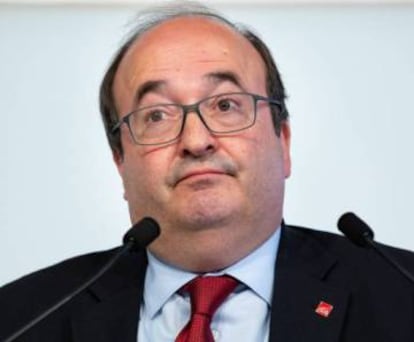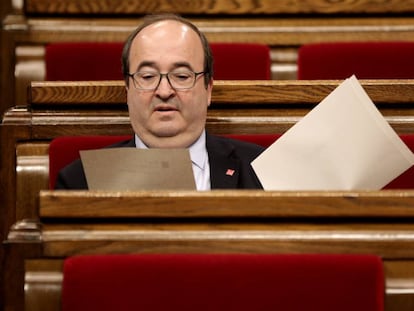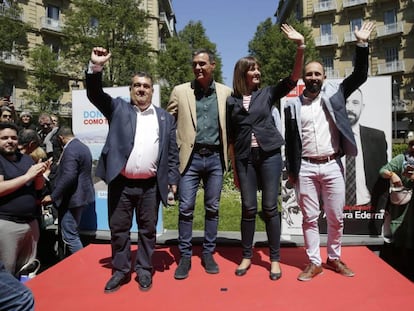After top pick gets rejected, Spain’s PM makes new choice for Senate speaker
Pedro Sánchez has been forced to name a new candidate for the upper house after Catalan separatist parties vetoed his first nominee, Miquel Iceta

Following the Catalan parliament’s refusal to appoint Miquel Iceta, the leader of the Catalan Socialists (PSC), as a senator on Thursday, the acting government of Pedro Sánchez has come up with a new candidate to replace him.
Sánchez is now nominating another native of Catalonia, Manuel Cruz, who is also a member of the PSC. The idea is to get him into the Senate, then make him speaker of the upper house. The new vote at the Catalan parliament to confirm his senatorial position will take place on May 21.
The picks are meant to symbolize a renewed desire for dialogue to overcome the territorial crisis
Manuel Cruz, 58, is a philosophy professor at Barcelona University who has lectured at European and US institutions. He has written around 30 books and is a regular contributor to several news organizations, including EL PAÍS. As a politician, he has served as a PSC deputy and a PSOE spokesman in the congressional committee for science, innovation and universities. He is viewed as a moderate who supports dialogue.
For speaker of Congress, Sánchez is proposing Meritxell Batet, who is also Catalan. The choices are meant to symbolize the acting PM’s desire for renewed dialogue to overcome the territorial crisis in the northeastern region.
The PSOE won the April 28 general election but fell short of an overall majority, and the acting PM needs support from other parties to get reinstated. Sánchez might need backing from Catalan nationalists in Congress to build a majority of 176 seats.

Earlier this week, Sánchez had warned Catalan separatist parties that to block Iceta’s nomination would be “to block social harmony, mutual understanding and dialogue.” He held up Iceta, a longtime leader of the Catalan Socialists, as an example of a politician who supports dialogue over confrontation.
But the Catalan Republican Left (ERC), Together for Catalonia (JxC) and Popular Unity Candidacy (CUP) voted against Iceta, whom they see as a representative of a party that supported the temporary suspension of autonomous government in Catalonia following the unilateral secession attempt of October 2017.
That move was greenlighted by the Senate, which was then controlled by the conservative Popular Party (PP). Following the latest election, the PSOE now controls the chamber.
The head of ERC, Oriol Junqueras, as well as several other political and social leaders who spearheaded the breakaway bid are now on trial at Spain’s Supreme Court for rebellion, sedition and misuse of public funds. Although they have been in preventive prison since November 2017, five of them secured parliamentary seats at the recent election, and they will be allowed out on May 21 to take office.
What went wrong?
When Sánchez called Miquel Iceta to propose making him Senate speaker, the latter was happy to accept, but warned that separatist parties would not be equally charmed and might even block the nomination.
But Sánchez could not believe that the Catalan Republican Left (ERC) would break with a tradition that has made these appointments a mere formality throughout the years.
Yet the unthinkable happened on Thursday, when all three separatist parties voted against Iceta – even ERC, which is widely viewed by Madrid as the most pragmatic of the pro-independence forces in Catalonia.
English version by Susana Urra.









































